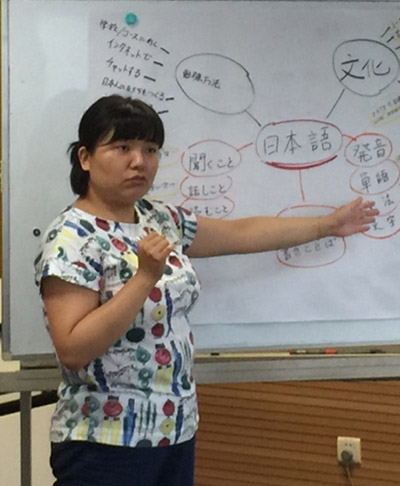"I agree with the approach"
Yi Lee (Beijing, China)

Yi started learning Japanese after a trip to Tokyo.It has been two years since she started studying on a JF Course at the Japanese Cultural Centre in Beijing. Yi is a Chinese teacher and she agrees with the approach of Marugoto, and tries to include the approach in her own lessons.
-What is your impression of using Marugoto to study Japanese?
Studying using Marugoto is a lot of fun and I always look forward to lessons. I also use it for ideas when creating my own Chinese language teaching materials.
-What do you like about Marugoto?
The layout is very logical and the printing quality is very good as well.It’s colourful and there are lots of photos and illustrations, which bring it to life.
The topics are very practical. Not only are new topics introduced, but previous topics are also repeated. Because the level of difficulty increases in a spiral, learning is broader and deeper.
Overall I think the contents and structure of Marugoto are very logical. The materials are vivid and interesting and each part is closely related. You can practise listening and speaking, and understand grammar rules.
Kana appears first and then kanji a little bit later. The pronunciation of kanji is shown, which is very useful for remembering pronunciation.
-What are your favourite Japanese words? Why do you like them?
I think the most appealing words are those that cannot be translated directly into Spanish that reflect the unique way of thinking of Japanese people. For example, words like komorebi (sunlight filtering through the trees), and irusu (pretending not to be at home). I also like words that are often used in daily life, but are difficult to translate into other languages, like shoganai (it cannot be helped) and onegaishimasu (please). However, the word I like the best is the one that describes me really well: tsundoku (buying books and just piling them up without reading). This is because I love books and often buy them even though I haven’t got time to read them.
-What would you like to do using Japanese in the future?
I’d like to travel to Japan and use Japanese more. If I have the chance, I’d like to try teaching Chinese to Japanese university students.
"You can learn practical Japanese related to real life"
Wang Meizi (Beijing, China)

Wang loves studying foreign languages. She started studying Japanese when she was studying overseas in France about two years ago.
-What is your impression of using Marugoto to study Japanese?
I like Marugoto a lot, and I think having lessons using these materials was a very valuable opportunity. Because the materials focus on situations where communication takes place and situations that can be applied to real life, there is lots of practice of discussions on the theme of culture and practice of dialogues, and lessons are very lively and interesting.
-What do you like about Marugoto?
I think the structure of Marugoto is very logical. By talking a little at first, moving on to the introduction of new vocabulary and important conversations, and then grammar and reading, in every unit you deepen your learning in stages, and the rhythm and speed of progress is just right.
In the textbook there are also trivial but interesting situations that make you laugh, such as a foreigner visiting a Japanese person’s home and their legs going numb because they were sitting down for a long time.
The content of the listenings is really sophisticated, and audio recordings and background music are great as well. I like to listen to the audio recordings over and over when preparing for and reviewing lessons. If you listen to the audio recordings a lot, you become able to repeat after them, and can get a sense of improvement.
-Do you have a story that illustrates the benefits of studying using Marugoto?
I went to Japan for the first time in the summer of 2017. Before setting off I tried booking a restaurant by international phone call, and I was excited because the transaction went smoothly (a lot of the phrases I used were ones I’d studied in Marugoto). This example was the first time I’d had a successful conversation in Japanese with a Japanese person outside the classroom, so you could say it was a small piece of evidence of the results of my study.
There’s another story. It was when I met a Japanese friend a year ago, and they wrote a comment on Facebook in Japanese. At the time I was secretly thinking someday I’d like to be able to read something a friend wrote, but I noticed I was already able to. I was really pleased because I’d made progress without noticing.
-What would you like to do using Japanese in the future?
I’d like to travel to Japan and use Japanese more. If I have the chance, I’d like to try teaching Chinese to Japanese university students.
